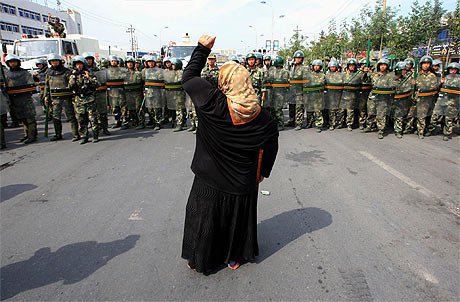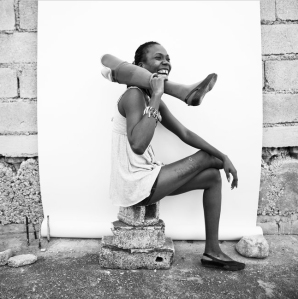Girls as young as 13 trafficked in Cambodia
March 18, 2011 § Leave a comment
Girls as young as 13 are being recruited from Cambodia to work in Malaysian households with fake birth certificates, according to a UN report out today.
The girls are being confined in overcrowded and unhygienic “training centres”, with reports of several being killed or injured in desperate attempts to escape – and of course, with human trafficking, someone makes money. And not the person being abused.
In this case, brokers source the girls and get paid the fees. The recruiting companies trick illiterate village residents – more than 100 agencies are reported to exist targeting this sort of business.
The government has made some very positive noises about tackling this problem, which can only be positive, but nonetheless estimated that it will take three more years to fully tackle this problem.
MP and former minister for women’s affairs Mu Sochua has accused the government of complicity in trafficking: “The Cambodian government has effectively legalized human trafficking.” She also said the government was protecting the recruiting companies because some of its members might have financial interests in them.
These examples could be the tip of the iceberg, with the likelihood of girls also being smuggled through into Thailand.
The best way to tackle this is to improve the status of women in Cambodian society, and their rights as female workers. Make a collective decision that it is not acceptable to employ a young girl, without her passport.
Women in Cambodia were denied the right to hold a rally for International Women’s Day this month. Bizarre rules around Cambodian women marrying foreigners are also intended to target trafficking but could easily also be seen as a way of restricting a woman’s human right to marry who she wishes. Domestic violence is largely seen as a matter to be left between husband and wife, even though one-in-four women have suffered physical, sexual or emotional abuse from their husbands
Give women equal status, equal standing in society, make them financially independent and this sort of abuse will be whittled away to a memory.
Related Articles
- Cambodian Sex Workers Raped, Beaten, and Electrocuted by Police (womensrights.change.org)
Sexism thrives in the Chinese workplace
February 16, 2011 § Leave a comment
Female workers in China are sexually discriminated against in the workplace, according to the country’s Women’s Commission. The commission has called for part-time workers to receive paternity rights to help counter discrimination against women who had to take pregnancy leave, and better rights for men to take time of to be with children.
Sharing the burden of childcare is something that’s been covered on this blog before – but China is a particularly interesting country to look at. I heard a very plausible theory that China has flourished economically because of its commitment to getting women in the workplace – compare this with somewhere like India for example, where cultural and religious factors have traditionally excluded most women from the world of work. If half of the population are kept in their homes, it can only hold back the economy and the state’s development.
Although historically women in China have been clearly placed as second class citizens – think bound feet, concubines, polygamy – the Communist Party brought with them a raft of rights for women, including the right to divorce and work. These principals have evolved over the last sixty years into a position where women traditionally control the household finances in the rapidly developing country. Men also vastly outnumber women due to the one-child policy and the status associated with having a boy, so when it comes to marriage and relationships, women are in a fairly strong position where they can afford to be picky.
In the workplace however, two-thirds of women think they are discriminated against, and more than 70% of respondents thought men stood a better chance of promotion than women of similar age and abilities. This interesting post on the China Law Blog discusses how many women are keen to work in US or international companies based in China, because they are less likely to discriminate. A quarter of women even admitted they hold back at work and try not to be too successful because they know it might will cause trouble with their partners.
Almost half of men in a recent census said that they believed it was solely the man’s job to earn money, while the woman should remain at home and tend to the family.
Some attitudes are slow to change, but bringing in some of the laws proposed by China’s Women’s Commission would send a very clear message that family life is something that both men and women are responsible for, and a note of optimism for the masses of women who work in China and are struggling to choose between career or children.
A year on: Four year old girls raped in Haiti
January 4, 2011 § Leave a comment
It’s hard to believe. As if there wasn’t enough heartache already in the country following the earthquake a year ago which is believed to have left more than 300,000 people dead, there are still a million people displaced, homeless, and relying on NGOs to support them as they live under tents and tarpaulins. According to those in the country, reconstruction has barely begun.
And then the cholera outbreak began. Followed by a disputed presidential election. And scenes of political unrest.
But the reports of rape in the country break the heart. This morning there were stories on the radio of raped women, and girls as young as four and five being raped in the chaos, and the stories brought me to tears amid descriptions of normal structures breaking down in communities.
There are reports of women fleeing into the countryside. Raped in the earthquake ruins. Taken away as “servants” for “work” (inverted commas due to the lack of payment involved – “slaves” might be a better word) Children as young as four and five being raped.
The situation was not great for women before the disaster. Rape was only officially recognised as a crime in 2005, and domestic violence was a long-standing problem. The earthquake fallout is running the risk of reversing progress that had been made.
As the New York Times reports: “Marie Cluade Pierre was sad even before the earthquake. She is sadder now.”
After a year of horrors, there is little to celebrate. The country is on a knife-edge – the only real question really is whether the balance has already tipped over. After all, many people will be wondering just how it can get worse.
But there are stories out there to inspire. One example to celebrate is the story of Fabienne Jean, a young dancer who lost her leg in the earthquake. Now walking on a prosthetic leg, she is starting to dance – only a little, and she is realistic about the fact that she will never be a professional performer again. But plans must be re-dreamed, and she is hoping to open a dance school, or a fashion boutique.
Equally, the work of “Eternal Optimist” Cameron Sinclair and his Architecture for Humanity, planning the rebuilding of the country – to name but one of hundreds of devoted individuals working to help stabilise the situation and provide a safer future. After all, solid bricks and mortar are the first practical protection for women at risk.
And read the story of Rea, one incredible woman who rebuilt her school literally from the ruins, and even started a micro-credit facility for women
It’s a sobering fact, but natural disasters are almost always worst for women. As the Haitian example proves, women are not safe in refugee camps, or living without protection. Their children are not safe. Medical care for pregnant women is very limited. There are scores of women who are forced into the Dominican Republic and trafficked into the sex trade.
Everyone can help and make some difference. Everyone, whoever or wherever you are. Let’s do our best to make this year the year of reconstruction that should have begun in 2010.


